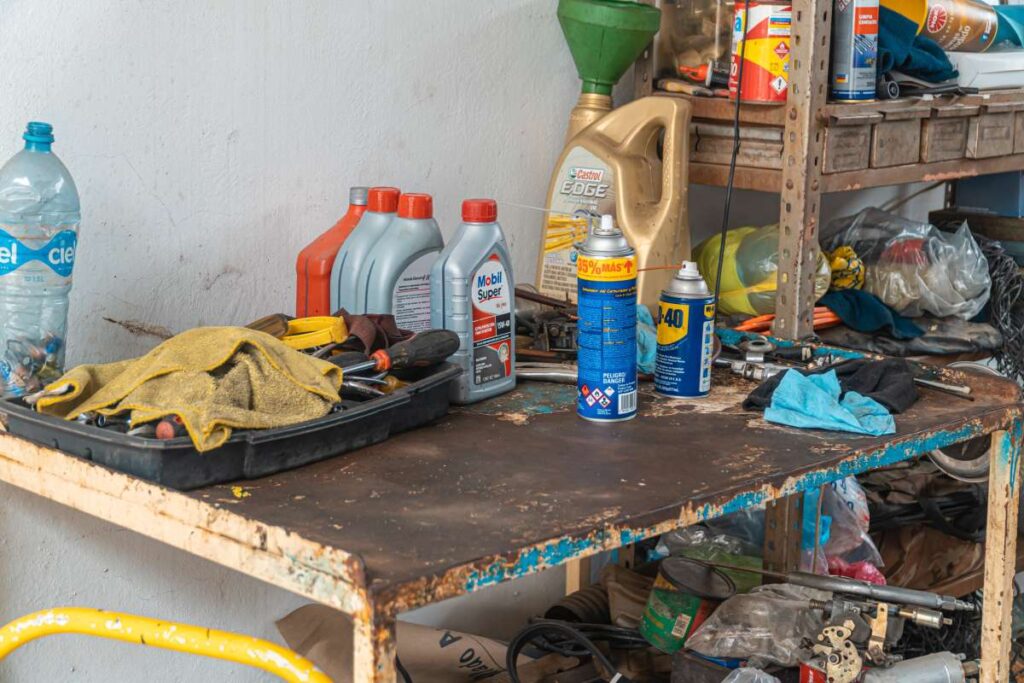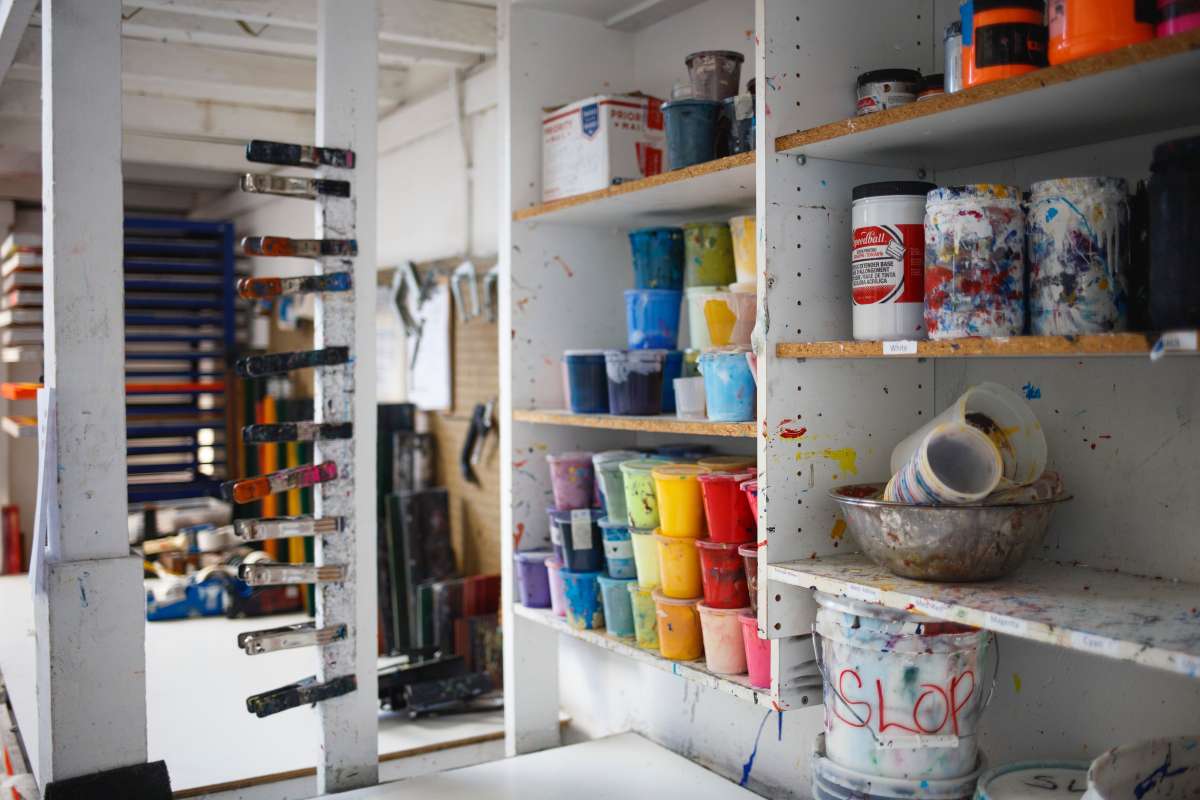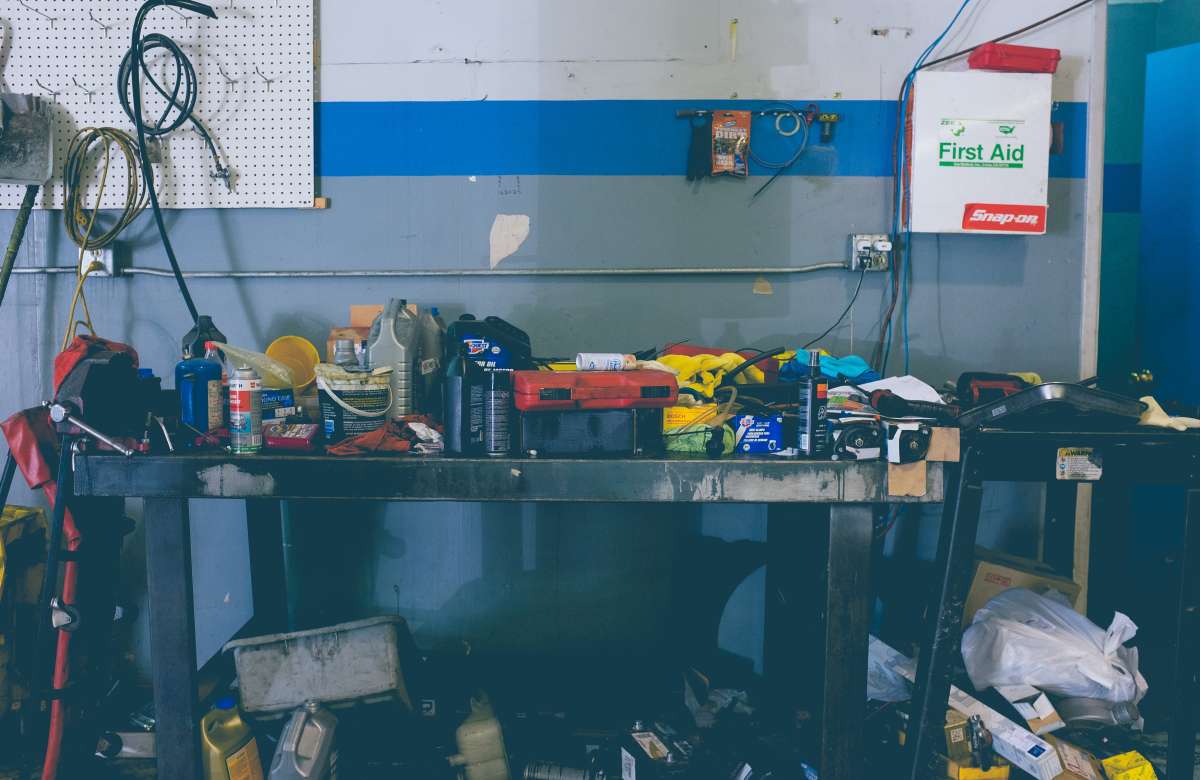Many people use their garage as a handy storage space for items that don’t get everyday use. And while recreational equipment and tools are ideally suited for the garage, some things should be kept inside.
Keep reading to learn what not to store in the garage. You may learn about some everyday household garage items that you should take indoors—right away.
Don’t ever store these items in your garage to keep your home safe and pest-free and your belongings in good shape. Garage Storage Solutions has a range of easy-to-install storage options to help transform your garage from a dull storage room to an organised space that’s there to be utilised!
Things You Shouldn’t Be Storing In The Garage.
Pet Food
Storing pet food in your garage is inviting pests into your home for a delicious snack. If you must keep pet food in the garage (or even when it’s inside your house), be sure that it’s inside a tightly sealed plastic or metal container. Rodents can easily chew through paper or cardboard packaging.
Pests don’t discriminate between human food and pet food, so leaving your Kibbles ‘n Bits in the garage will cause the same problem as fresh food. Pet food should also be stored in a sealed container in the house.
Fresh Food
You may think the garage is an excellent place to store food like bread, bananas, and other pantry staples, but leaving these foods out in the garage is like inviting all the pests around to come for a feast. Keep these foods indoors in sealed containers!
Oily Rags
Never store oil-soaked rags in your garage. Spontaneous combustion (and a devastating fire) can occur when oily rags are held where the generated internal heat isn’t allowed to escape.
Books
You want to save your favourite books from childhood to give to your kids or grandkids someday, but storing them in the garage isn’t the best solution.
Silverfish are insects that thrive in the dark, damp environments such as garages, basements and crawl spaces, and these bugs love to feast on starchy substances, such as the glue that binds books.
Firewood
While firewood may be an essential year-round staple in your home or backyard, it’s also a magnet for pests that will happily make the jump into your house.
Store firewood at least 20 feet away from the house — including the garage — and only bring in as much as necessary.
Firewood is excellent to have around when you want a cozy winter fire but make sure to keep your stash at least 20 feet from your house.
Otherwise, pests might be attracted to the firewood and then eventually make their way into the house.
Wood Furniture
Furniture can warp in the heat, so if you have valuable pieces of wood chairs, tables, or dressers, store them in the house or temperature-controlled storage space.
Sleeping Bags
Fluctuating temperatures and humidity are not ideal conditions for storing fabric. It can get mouldy, and rodents love to chew it.
It’s tempting to stash sleeping bags with other non-fabric camping supplies in the garage, but don’t do it! Store sleeping bags, clothes and other fabric items inside your house.
Paint
Do you keep paint around for quick wall touch-ups? If so, make sure you store the can of colour in a safe spot in the house.
If you leave your paint in the garage, extreme temperatures could alter the formula, turning it into a sticky, gloppy mess.
Extreme heat and extreme cold can alter paint formulas. So if the temperature in your garage is a rollercoaster throughout the year, it’s not an ideal place for storing your leftover paint.
Check the paint can label for recommended storage temperatures. But if your colour happens to freeze during the winter, it’s not necessarily ruined.
Toys
Your child’s favourite toys — especially stuffed animals and other plush toys — should be stored in an area other than the garage.
Dust mites, other insects and even mice may have their way with the toys if given a chance. If you must store toys in the garage, make sure they are in airtight containers.
Wise parents like to rotate their kids’ toys or put away the toys they’ve grown out of, but these toys should be stored in the house or temperature-controlled storage space.
Mice and insects could chew on the toys, contaminating or damaging them for good.
Propane Tanks
A propane tank is usually safe, but if it happens to leak in an enclosed space such as your garage, any tiny spark — even starting your car — can cause a fire.
Keep them outside in an area that won’t be subject to extremely high temperatures.
If you’re into grilling, it’s wise to have an extra propane tank on hand in case you run out while cooking up dinner. But propane tanks can leak and catch fire, so it’s safest to store them outdoors in a ventilated space.
Old Computers
Humidity and temperature fluctuations can cause computers and other electronics to short out. So always store electronics inside your home.
And if it’s time to get rid of old computers, follow this advice instead of cluttering up your garage.
Printed Photographs
Printed photos (especially those with digital copies) should never be stored in the garage. Heat, cold and humidity will quickly ruin those cherished memories.
Whether you have piles of family scrapbooks or a small collection of antique photos, please keep them in the house where they’ll be less at risk of damage.
Storing these items in the garage leaves them exposed to extreme temperatures and humidity, which could ruin the photos forever.
Important Papers And Files
Don’t risk keeping those essential papers such as medical records, passports and birth certificates in your garage.
The same goes for photos, as they could be damaged by water and excess moisture in the air. If you need to keep some paper items in the garage, store them in an airtight plastic container.
Refrigerator
Many people have fridges overflowing with food, so they think a backup fridge in the garage will be the perfect solution.
But before you go out and buy a second fridge, know what you’re getting into. A refrigerator in the garage will have to work extra hard to control the temperature in cold or warm seasons, majorly running up your energy bill.
Electronics
Do you have extra DVD players, televisions, or computers? Keeping them in the garage can render them useless since extreme heat or cold could permanently damage them. Instead, store them inside or donate them if you don’t need them anymore.
Important Documents
Like photographs, important documents can be damaged when left out in an environment that isn’t temperature-controlled. Keep items like passports, birth certificates, and other valuables in a designated spot inside the house.
Wine
Fluctuating temperatures and humidity can alter the taste of wine. Luckily, we’ve got this fantastic indoor storage idea that you can build yourself.
Though some people might think of the garage as a great alternative to a wine cellar, storing wine in this environment can alter the taste—keep the wine in a place where it won’t be exposed to humidity or fluctuation in temperature.
Old Clothing
Consider storing your old clothing — whether your favourite dresses, winter coats or sweaters — someplace other than the garage. Clothes attract moths, and fur and leather don’t hold up well when stored in damp areas. So instead, keep clothing in sealed plastic bags and store it in another place of the home.
Some families use the garage to store off-season clothing or clothes their kids have grown out of, but this comes with a risk. Clothes stored in the garage are susceptible to dust mites and other insects, and you might discover holes in them when you take them out to wear again.
Canned Food
Contrary to what you may think, canned foods are not spoil-proof and should be stored at temperatures between 50 and 70 degrees. Humidity in a garage can also cause cans and metal lids on glass jars to rust, potentially causing a chemical reaction with the food inside.
It’s true; even canned food shouldn’t be stored in the garage. However, as with other types of food, canned food will last longer and be less likely to spoil if kept at a temperature between 50 and 70 degrees, so store your beans and corn in the pantry with your other foods.
Rugs And Carpeting
Rolled up rugs and carpeting make great homes for insects and mice, so consider storing them in a spot other than your garage. Unfortunately, the rug and carpet fibres will also absorb moisture and odour, which may ruin them if left for long periods.
If you’ve ever replaced your carpet or rugs, you may be tempted to store the old ones in the garage. But this will be an invitation to mice to cozy up in the warmth of a new home. Unfortunately, the rugs and carpets can also soak up moisture and odours from the garage, doing permanent damage. Be sure to find smart garage shelving solutions when packing and storing your belongings. From a simple, one-room project to a cross-country move, a professional organiser like Garage Storage Solutions can help to make your life easier.
Hazardous Materials
Always be careful with flammable or otherwise hazardous materials. For instance, keep propane tanks out of the garage (and other enclosed spaces), which can leak and ignite. Instead, store them outside in a well-ventilated area.
Gasoline can be stored in a garage. But make sure to use an appropriate container, and keep it far from ignition sources, as well as children and pets.
Furthermore, if you’re holding onto hazardous materials you no longer need, it’s better to be safe than sorry. So take the time to dispose of them properly, rather than sticking them out of sight and out of mind in the garage.
Items That Attract Insects Or Vermin
Insects and vermin are rather good at finding their way into garages, even if you think you’ve sealed all the holes.
So don’t tempt them by storing items in your garage that they can make a meal out of or home in. This includes clothing, bedding, books, papers, and firewood.
And, of course, don’t keep actual food accessible in the garage, including pet food and wild bird seed. Pests often can detect food, even if it’s packed in a storage container.
Fragile Or Valuable Items
Even if you’ve done work to insulate your garage, it’s still probably more exposed to outdoor temperature fluctuations than the rest of your home. So as a general rule, don’t store anything in your garage that you wouldn’t keep in the trunk of your car.
Extreme temperatures and excess humidity can cause many items to warp, crack, or otherwise become damaged.
Likewise, while the garage might seem like a convenient spot for an extra refrigerator or freezer, these appliances will have to use a lot of energy in hot weather to keep the food cold.
Finally, don’t risk storing things in the garage that are worth a lot to you, either monetarily or emotionally. In addition to being vulnerable to weather, a garage is often a target for thieves.
What To Store In Your Garage
For the most part, the items you should store in your garage have a common theme: They’re all items you generally use outdoors.
Car Supplies
If you have a car, it probably spends a lot of time in your garage or parked nearby. So it’s logical to store items you use for your vehicle, including wiper fluid and tire inflators, in your garage.
A garage is also a good place for items you often transport in or on your cars, such as a roof rack or camping gear. If you have space, hang bulky items like roof racks on the wall or ceiling of your garage.
This will help to keep the garage floor space clear for parking your car. As for the smaller items, consider a plastic storage rack with bins or a storage cabinet meant for the garage. This will keep the space organised and make finding items when you need them a breeze.
Yard And Gardening Tools
The garage is the ideal home for tools and appliances you only use outdoors. Think shovels, hoses, outdoor extension cords, lawnmowers, gardening tools, flower pots, and more.
Bags of potting soil, buckets of ice melt, and other outdoor supplies that come in bulky packaging are also good candidates for garage storage. Consider putting up a pegboard or a similar product to hang tools where you can easily see them and grab what you need.
Outdoor Toys
Any product made for outdoor entertainment can withstand the elements, so it’s usually OK to keep it in the garage when it’s not in use. This includes children’s toys, pool accessories, bicycles, and patio furniture. Consider hanging items like lawn chairs from hooks on the wall to get them out of the way. And you can keep toys in wire or clear plastic storage bins, so you can easily see what’s inside.
Infrequently Used Items
If you need to store any items you rarely use, the garage—like the basement or attic—is often a great place to hide them away.
The garage also can be an excellent temporary storage spot for items you ultimately plan to get rid of, as well as items that don’t have another home at the moment.
Just keep in mind that sturdy, weatherproof objects will do better in the garage. More delicate items, such as documents and electronics, will hold up better in a basement or an attic.
What Is Safe To Store In A Garage?
You now have a much better idea of what not to store in the garage. But you still want to take advantage of the storage space out there—so what is safe to keep in the garage?
Thankfully, there are still many items you can safely store in the garage, freeing up storage in your home and giving you easy access to tools and equipment you may need while working in the garage. Here are some ideas of things you can keep in the garage without worrying about them getting damaged:
- Car equipment and accessories (wiper fluid, spare tires, roof racks)
- Power tools
- Outdoor gear (tents, tarps, backpacks, etc.)
- Gardening tools (rakes, shovels, pots)
- Lawn care tools (lawnmowers and more)
- Outdoor toys (bikes, slides, pool accessories)
- Patio furniture
- Seasonal decor (Christmas trees, outdoor lights, ornaments)
- Coolers and summer accessories
- Gym equipment (weights, workout machines)
- Sports equipment (balls, bats, gloves, shoes)
How Do You Store Chemicals In A Garage?
Do you have bleach and other cleaning supplies you want to store outside the house? While it’s important to keep hazardous chemicals out of reach of children, it can still be just as dangerous to store them in the garage.
Some chemicals are sensitive to temperature changes, and in any case, there are areas in the garage where pets or kids could still reach them.
So how do you store chemicals in a garage safely? Here are some tips:
Store Chemicals In High, Secure Shelving.
Keep in mind that some children may be tempted to climb shelving, so you should make sure the chemicals are out of sight and won’t fall off the shelves.
Store Chemicals In Their Original Containers.
Most chemicals come with warning labels and instructions for use—and a good reason.
Though it may be tempting to store chemicals in other reusable bottles, keep them in the original container to avoid mix-ups or unintended use.
Consider Locking Up Your Chemicals.
If you have children or pets, it’s wise to consider a chemical storage cabinet with a lock. These cabinets could save lives and allow you to store chemicals within accessible reach.
Label Your Chemicals.
If you have chemicals stored in an empty or clear bottle, label it clearly and correctly. You may think you’ll remember what it is, but it’s best to play it safe and always know what you have on hand.
Can Appliances Be Stored In The Garage?
Many homeowners choose to stash refrigerators, microwaves, or other appliances in the garage for a time when they might want to use them again. But can devices be stored in the garage?
No—we advise against storing any appliances in the garage since they can become damaged in several ways.
Because most garages do not have climate control, appliances stored in the garage could soon be unusable, damaged by extreme heat or cold. Devices can also be damaged by tools or other items falling on in the garage or moving cars or people.
It’s Time To Take These Household Garage Items Inside
Do you have any of these things in your household garage? If so, it’s time to bring them indoors. Set aside time this weekend to reorganise your garage space. It will be well worth the effort! Garage storage wall hooks should form part of any garage makeover as they provide a clean and really easy way to lift anything from your garage floor and have it accessible via your garage wall.


